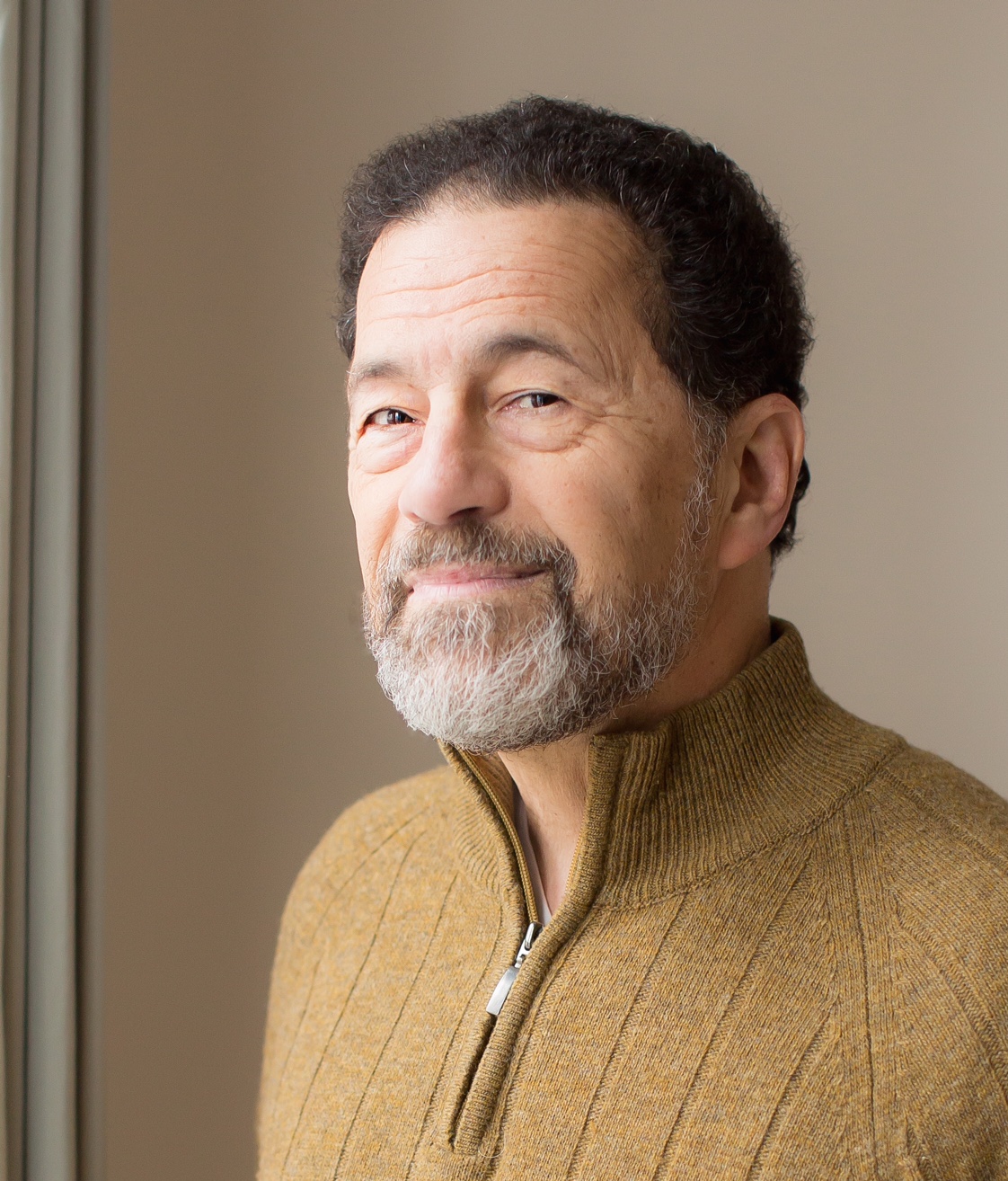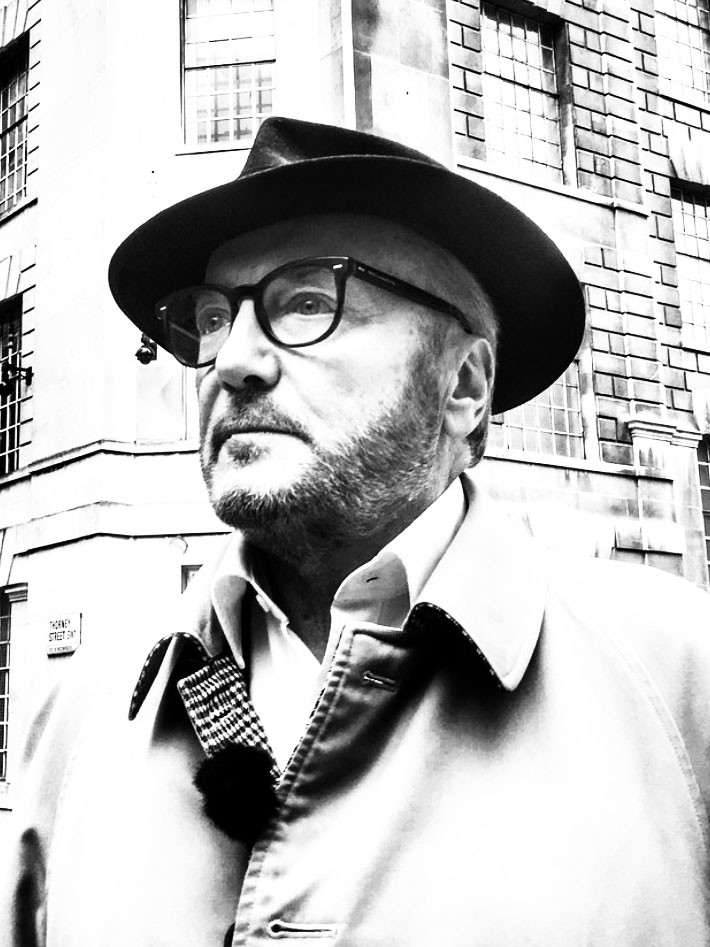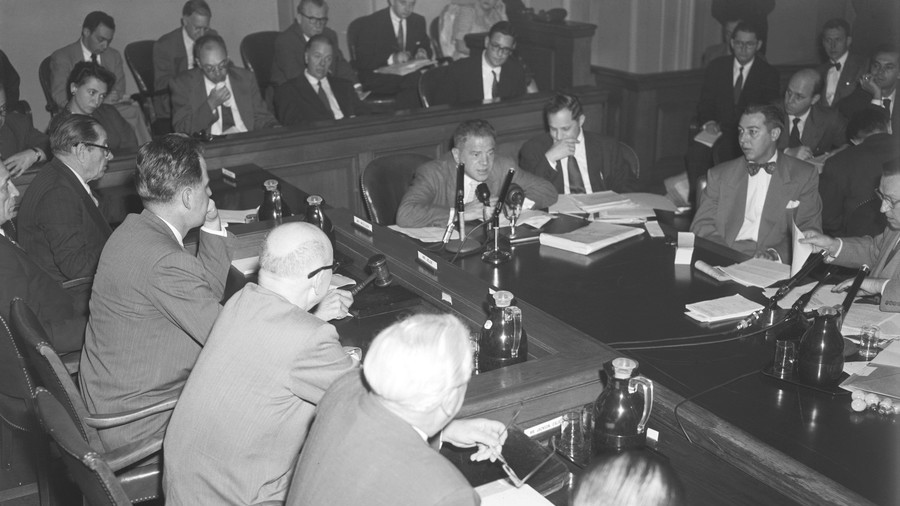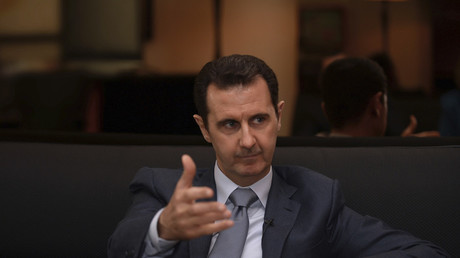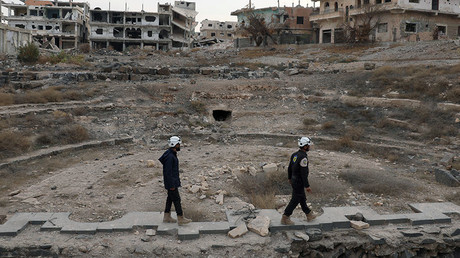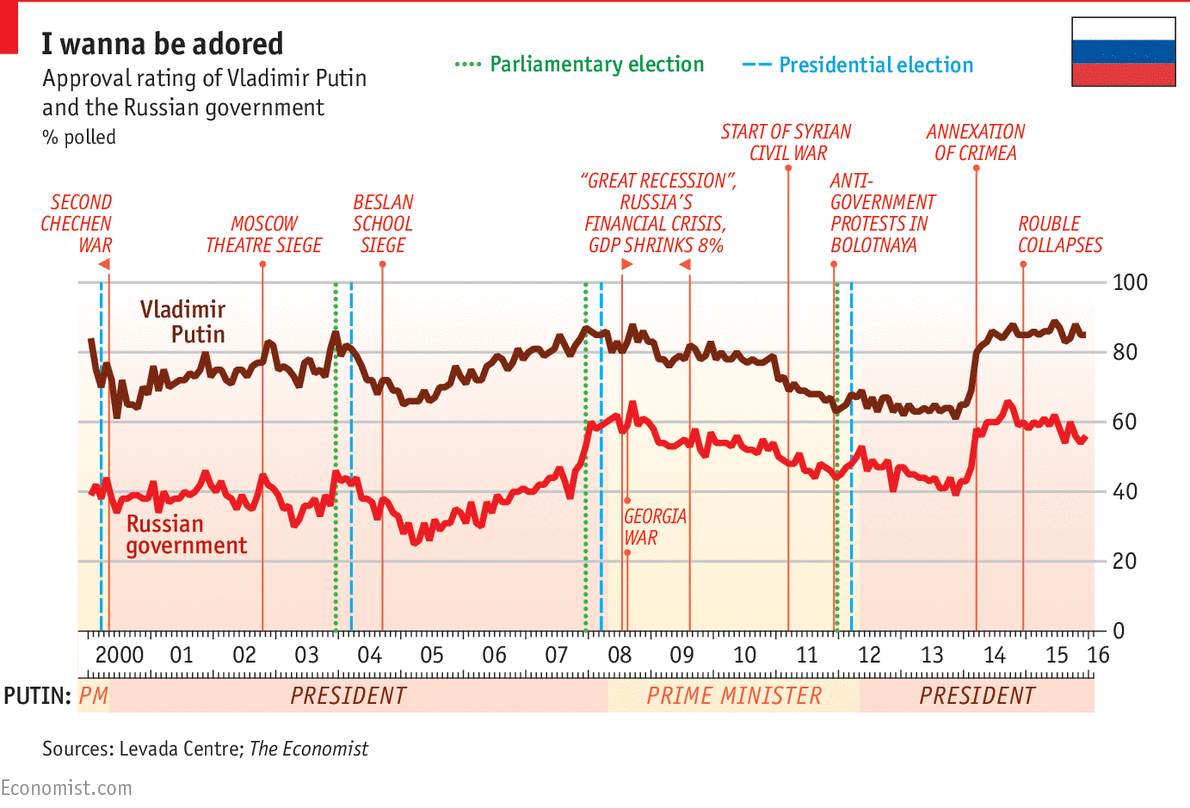The Parallel Universe of BBC Panorama

The BBC flag-ship documentary series “Panorama” has long been a stalwart of state-funded television propaganda. They can always be relied upon to tell us what we’re supposed to think. In 2013, just days before the Commons vote on military intervention in Syria, BBC aired “Panorama: Saving Syria’s Children”, a shambolic piece of fiction designed to outrage the public into war.
Robert Stuart has done truly exceptional work in deconstructing the fakery and propaganda on which the BBC sees fit to spend taxpayer’s money.
In just the last year they’ve had two documentaries about North Korea being evil (“North Korea’s Secret Slave Camps” and “North Korea’s Nuclear Trump Card”).
And it’s not just foreign “enemies” that end up in Panorama’s crosshairs either – it’s also domestic ones.
In 2015, just a few days before Jeremy Corbyn’s first Labour leadership victory, the BBC aired “Panorama: Jeremy Corbyn – Labour’s Earthquake”, a documentary which prompted Corbyn’s team to file an official complaint, labelling it a “hatchet job”.
Then in 2016, on the eve of Corbyns second (larger) Labour leadership victory, the BBC aired “Panorama: Labour – Is the Party over?”, a documentary full of doom and gloom, featuring anecdotes about abuse, and various (predictable) Blairite MPs bemoaning the “unelectability” of their leader.
In the 2017 General Election, Jeremy Corbyn’s resurgent Labour defied the polls, the pundits and the BBC to knock-off the Tory majority and come within 2% of winning. Could the BBC’s, and Panorama’s, relentlessly negative slanted coverage be responsible for keeping Corbyn out of No.10? It would be foolish to deny the possibility.
And there, neatly demonstrated in those three paragraphs, you see the value and purpose of state-sponsored propaganda. Panorama is the spirit of the BBC, a pretense of faux objectivity, shrouded in cuddly familiarity, employed exclusively and decisively against anything the establishment sees as a threat.
*
Enter Vladimir Putin
The folks at Panorama LOVE Putin, or at least love to hate him. In the last two years there have been no less than five (five!) episodes devoted to the man, and indeed the myth.
January 2016 brought us “Putin’s Secret Riches”, January 2017 “Trump: The Kremlin Candidate”, March of this year brought us two inside a week, “Putin: The New Tsar” and “Taking On Putin!”. As the titles suggest, none of them were especially objective or open-minded. That’s not in the BBC’s remit.
The most recent Putin-hit piece aired just last week – in the run up to the World Cup – its rather more mundane title simply: “Putin’s Russia with David Dimbleby”. The documentary, for want of a better word, opens on David Dimbleby wandering through a Moscow market looking at sigh Russian nesting dolls, and it doesn’t get less predictable from there on in.
A long time ago, I was taught you construct an argument in three steps – “Statement, Evidence, Conclusion”. Instead Panorama opted to go for the unorthodox “Conclusion, Anecdote, Stock Footage of Nesting Dolls” approach.
 The first problem, and perhaps the biggest, is David’s hat… but it never really goes up-hill from there.
The first problem, and perhaps the biggest, is David’s hat… but it never really goes up-hill from there.
The second problem, is the smugness. Forget the factual inaccuracies re: the Russian economy, forget the totally evidence-free assertions, and just focus on the smugness.
The smugness of an English man who went to Charterhouse School, and then on to Oxford, is possibly one of the most toxic things in the world. So much evil has been done by men who are taught their own effortless superiority. Blood has been spilled by such men, oceans of it, evils done beyond imagining, all with a soft chuckle and clear conscience, because they come from a system that tells them their very existence MAKES them RIGHT. They do the “right thing” as a matter of course because of who they are and what they think. They are right, and the vast swamps of Other are wrong, and that’s just the way it is.
These are the people who spread the British Empire over a quarter of the globe, all the time telling themselves that they were doing the savages a favour by giving them civilisation. The same men, the same minds, in suits that change with time and with methods that shift with the ages, have run the country for centuries… and run the BBC since its inception. Men who believe morality is a function of their very existence. A path that rises up to meet their feet.
This is the British version of what the Americans call “exceptionalism”. It’s less brash, and less obvious, but no less poisonous for that.
The worst actions of mankind flow from minds who never question their own moral position, and this documentary can be counted as small, septic, addition to that list.
And so we begin…
I’ve come to see how Putin has managed to hold on to power for so long, and what the Russians see in the Putin that We, in the West, don’t.
Dimbleby’s introduction is immediately partisan and dishonest – referring to “we” in the West as if there is a consensus, when clearly that is not the case, is a variation on the argumentum ad populum, the argument to common knowledge. “Everybody knows that”, or “We all agree on this”. It is deceptive language, being used to paint a false picture.
Likewise, saying Putin “held on” to power for so long, makes it seem like his Presidency was an act of force, when all the evidence is to the contrary. Dimbleby says so himself just a few minutes later.
(SIDEBAR: When Dimbleby says “so long”, he means 18 years. The classic mainstream media trick of ignoring Medvedev’s term as president is employed here. As is every other, long discredited, anti-Putin rhetorical device.)
In a democracy if you failed to deliver on your economic promises, if you surrounded yourself with cronies, and if you used the law to oppress opposition, well you’d be thrown out on your ear… but this is Russia, and they do things differently here.
Dimbleby lays out, in one broad stroke, that Russia is backwards, and silly, and he’s going to come along and point out to us sensible Westerners just how they went wrong.
Leaving aside the hypocrisy (this is, let’s be honest, a pretty accurate summary of what every single British government has done since Margaret Thatcher), it’s also simply insulting. I find it insulting, and I’m British. If I was Russian and heard that? I would vomit blood.
It’s sickening… and we’re only 2 minutes in.
*
David on… the Russian Birthrate
Our first port of call on David’s whistle-stop tour of everything that’s shit about Russia is the birth rate. He tells us that it fell sharply in the years following the collapse of the USSR, and this is true, he doesn’t say WHY this happened. As a matter of policy this programme avoids, at all costs, mentioning what Russia was like in the 1990s.
Anyway, when Putin came to power the birth rate was declining, and what did he do about this? Well, in a masterstroke, decided to encourage people to have babies.

Mrs Cherenkova’s medals
How? Well by increasing state benefits to mothers with more than 2 children, and further increasing them for families with more than 3 children. Families with multiple children are also entitled to free school meals, tax breaks and get discounts on family holidays. Medvedev also introduced a medal in 2008 – “The Order of Glorious Motherhood” – for mothers with 7 or more children, based on the “Mother Heroine” medal from World War 2.
(SIDEBAR: It’s worth noting here that we, in lovely hugs-and-flowers Britain with our nice fluffy democracy, DON’T have free school meals… for anyone. At all. Ever. The government that proposed this bill was not “thrown out on their ear”, but DID have to spend £1.4 BILLION pounds bribing a minority party to vote it through.)
The measures worked, and under Putin/Medvedev the birthrate has increased almost every year since 2000. In 2011 the birthrate moved ahead of the death rate for the first time since 1992, and Russia’s population started growing.
Now, if this is all sounding very sensible and not at all bad to you, then well done for paying attention.
It’s here the film reaches its first hurdle… and goes into it face first. Russia is supposed to be backwards and Putin is supposed to be a brutal corrupt dictator with no concern for the country he runs… but the facts on the ground don’t jive with this at all, at least in the birthrate example. Not only did he try to improve his country, but he did via perfectly reasonable methods, and they worked.
The film makers decide to simply leave an ellipsis on this one, just a long pause that’s obviously designed to make us ruminate on how bad Russia is, but it doesn’t really work. Partly because it doesn’t make any sense, but mostly because – for some reason – David thinks the best way to hammer this point home is show us the Cherenkovas. A very happy family with lots of healthy children. He refers to them as “Putin’s ideal family”, as if the term itself is insulting.
Mrs Cherenkova proudly displays her medals for motherhood in a leather case, explaining she wears them on public holidays. The family sing as they sit down for dinner, talk about the Church and how life has improved under Putin compared to the 1990s. (David, staying true to his brief, doesn’t ask how bad things were in the 1990s. In 58 minutes it’s not mentioned once.)
*
David on… the Russian Orthodox Church
The Cherenkovas praying as they sit down to dinner provides a neat segue for David to discuss something really terrible – the growing influence of the Russian Orthodox Church.
You see, the ROC was suppressed under Communism, which was bad, and now it’s not… which is apparently, also bad. I don’t fully understand the point David is trying to make, but that’s OK since I’m pretty sure he doesn’t either.
We are presented with a Bishop, who tells us that it’s now easier for the Church to interface with the state than it was during the 1990s. We don’t know what he means by that, because he’s cut off and David never asks.
The implication, backed by stock footage of Putin lighting candles in a church and David’s narration about “conservative values”, is that Russia is becoming a kind of quasi-theocracy. It’s never stated out-loud, because the position is so ridiculous as to be indefensible, but it is quite clearly the implication.
*
David on… Russian Opinion Polls
Curious to see “how widely [the Cherenkovas’] views are shared”, David goes in search of a broad opinion, but meets an apparent problem:
It’s all very well to say “I’ve come to Russia to find out what the Russians really think”, but it’s not actually that easy in a country where the press, radio and television are all strictly controlled by an authoritarian government.
1) He hasn’t gone there to find out what Russians think. He knows what Russians “really think”. He’s there to tell US why THEY are wrong. He’s there, at our expense, to make sure we hate who we’re told to hate.
2) The press, radio and television are not all “strictly controlled”, that’s a lie, and he knows it’s a lie because he proves it himself less than 10 minutes later.
But that’s beside the point. How does David get around the problem of finding out what Russian’s “really think” under such an authoritarian regime? Well, he goes to the one of the biggest public opinion polling companies in Russia, the Levada Centre.
The irony of rambling on about Russia’s repressive controlling government as you take a gentle stroll down to the partly-American funded NGO, just minutes from Red Square, is apparently lost on David.
Imagine, if you can, a Russian-funded “polling centre” operating within walking distance of Westminster or Pennsylvania Avenue. That not only calls the government-run polls inaccurate, but claims that the CIA forces people to vote and that the President is corrupt.
It would never be allowed to happen, but in “authoritarian” Russia, with its “strictly controlled” media, this is the current reality.
In the Levada Centre (Russia’s only “independent” polling centre), David finds out that around 80% of Russian’s support Putin as President. Which everyone in the world already knew.
The fact the “independent” Levada’s centre polls almost perfectly align with the apparently unreliable government polls doesn’t cause anyone to question their assertions about corruption or dishonesty. It’s one of the many inconvenient truths the Panorama team feel the need to brush over as quickly as possible.
When the head of the Levada Centre claims a President with an 80% approval rating had to “force” people to vote, David doesn’t ask why, or state that it doesn’t make any sense. No, he just makes concerned faces at the camera.
They discuss the “annexation” of Crimea as Russia “taking back” what is theirs, with no reference to the polls that show huge Crimean support for the move, going all the way back to 1992, including those done by both the American and German governments.
*
David on… Propaganda
From Crimea it’s a steady flow to “propaganda” – theirs, not ours – Dimbleby narrates in solemn tones:
For most Russians, state-run television remains the main source of television news.”
… blithely passing over that this statement is being made on a state-run television station, that is the main source of television news for most people in Britain.
He goes from Russian domestic television to RT, saying they are “accused of spreading conspiracy theories”, he doesn’t say who accuses them, or ask his audience to consider the possible reason behind such accusations. He doesn’t even throw the weight of conviction behind it enough to make a declarative statement. No, just sends out the little accusation, evidence free and with no reply or counter, and hopes the implication does its job.
He interviews a British anchor for RT, who says that they aren’t told what to say, and he’s “answerable to no one but his own conscience”. To which David replies, “And that’s clear is it?” The anchor explains the structure of RT, but David isn’t listening. He’s too busy making a documentary demonising a designated “enemy” for a state-funded broadcaster.
He doesn’t pose the same questions about his own conscience.
It’s always worth remembering that the BBC, formerly the British Broadcasting Corporation, is not “independent”, even though they’ve spent decades pretending otherwise. We’re encouraged to think of the BBC as a friendly presence, our shared “Auntie Beeb”, cosy and reassuring and honest. It’s none of those things, it’s a state backed broadcaster with a history of launching pro-government, pro-war propaganda, for which it never faces censure or punishment. It’s a much a less “friendly auntie”, more a threatening “big brother”.
With truly Orwellian posters intimidating us into paying for it.

Imagine this poster was in cyrillic and about RT.
That Dimbleby can stand under the banner of one of the biggest state-funded media organizations in the world, and pontificate about “media control” from an “authoritarian government” demands levels of cognitive dissonance few would think possible. It’s marvelously without irony.
*
Next David seeks out a human rights lawyer to discuss Russia’s legal system. David tells us that Russian judges convict in 99% of cases. This is apparently shockingly high. It does sound high, but deliberately left without context to make it seem worse than it is.
Firstly, the 99% refers only to Judge cases. Jury trials are relatively new to Russian law – in fact Putin, in one of his desperate power grabs, introduced them nationwide in 2003 – and they have a conviction rate of roughly 80%, right in line with the UK’s own courts.
A high conviction rate is not unheard of, especially in systems that run “special procedure court hearings”, a slightly complex system of what amounts to plea bargaining.
Japan runs a similar system and has a conviction rate of nearly 100%, as does Israel. The US federal courts had a conviction rate of 93% in 2012. Will we be seeing documentaries about that? No.
I’m not a lawyer, I’m in no position to launch a full defense of the Russian legal system – for all I know it is corrupt and/or unfair. But there’s no evidence in this film that shows it to be the case, outside of some anecdotal evidence from one lawyer.
Then they move on to Putin’s “online crackdown”.
Apparently Russia is starting to try to censor the internet. How? We don’t know, they don’t tell us. They cite no laws and name no Acts. It is just anecdote after anecdote. There’s no body to any part of it. We’re told Putin wants more control of the internet, as if this is shockingly tyrannical and when Dimbleby says there is…
… a crackdown on what the security services call “online extremism”.
He thinks his scare quotes show some desperately dystopian alternative universe, but doesn’t seem to know, or at least acknowledge, that WE call it that too, or that our very own dear Theresa May called for a “crackdown in online extremism” in a speech just last year.
Or that she put having an entirely government controlled internet in her manifesto last year.
Or that she passed an act in 2016 which Edward Snowden described as:
The most extreme surveillance in the history of western democracy.
Is Panorama asking questions about that? Of course not.
Does the BBC call our government authoritarian? Not once.
Instead they offer just a talking-head, making a scary statement that “thousands” of innocent Russians could be in prison, with again no evidence to back it up at all.
When you actually dig into the numbers they tell a completely different story.
The New York Post, not known for its pro-Russia bias, reported that 233 Russians were convicted of “hate speech” in 2015, “most of them for online activity.”
Meanwhile, in happy bunny funland Britain, 2015 saw 857 people arrested for “offensive” tweets or Facebook posts… in London alone.
It sounds like we’re more “authoritarian” than the Russians on the internet front at least. A fact which takes maybe 30 seconds of research to find.
*
David on… Russia’s Controlled Media
Next David goes to Echo of Moscow Radio to talk to one of the completely non-existent members of the independent media in Russia. She claims that the entire country is actually run by the KGB. As per usual, she produces no evidence for this statement, she just says it. But that’s good enough for David who asks her to “explain how the KGB dominates society”, underlining that the KGB and MI6 are not at all similar:
Explain to our UK viewers, who might think of the KGB as just like our MI5 or MI6… how the KGB dominates society?”
Got that everyone? There’s their spies, and our spies, and they are completely different. This attitude was ridiculous enough to be used as satire in Blackadder, but now is being seriously repeated by one the BBC’s most respected personalities.
Her “explanation” involves simply repeating the same sentiment she already expressed, only in slightly different words, and David is too polite to press for more, or too lazy to be bothered, or too smug to notice. It’s really getting hard to say at this point.
(SIDEBAR: Of course one of the most prominent ways that MI6 and the KGB differ is that the KGB doesn’t exist anymore, whereas MI6 are very much still going.)
It’s at this point the documentary seems to realise the rather confusing contradiction of its own existence. They are there to talk about how autocratic and terrible Russia is, and yet they seem to talk to human rights lawyers, anti-government television hosts and the head of anti-Putin radio stations. If Putin has all dissidents and protestors locked up and/or murdered… how do these people exist?
They get around this in one, short sentence:
By allowing a few independent outlets, a few dissident voices, Putin can claim freedom of expression.
Brilliant logic. Unfailing reason. Yes there’s SOME freedom of speech, but only so Putin can say there’s freedom of speech, it’s not REAL freedom of expression.
It just looks like it.
Much like that old expression:
“If it looks like a duck, swims like a duck and quacks like a duck, then it’s not really a duck because Putin doesn’t allow ducks. He’s just letting that duck exist so he can pretend he’s got a duck.”
*
The Russian Orthodox Church seems to be a real bugbear of David’s, because fresh from announcing that “there IS free-speech in Russia, it just doesn’t count”, David goes back to talk to a member of the Church… and asks him if he approves of the lack of free speech in Russia. David narrates:
When it comes to political repression, the one place not to look for support is the Orthodox Church.”
This sentence implies we’re about to hear a Church spokesman defending political repression… which is not the case. Instead we see the same bemused Bishop as before, being asked:
You know there’s a lot of criticism of Putin’s encroachment on human rights: People in prison for speaking out against the state, internet communications closed down, the state spying on people’s communications, do you approve of all that?”
Note he’s asking “do you approve of…”, not “is this the case…”. Leading questions predicated upon unproven assumptions have no place in honest discourse… but if you took them out the documentary there would only be 3 or 4 minutes of stock footage of nesting dolls and onion domes.
The bishop, who seems slightly perturbed by the rudeness of the question, evidently wasn’t provided with a script because he doesn’t launch into a fascistic diatribe about values, or verbal attacks on traitors and dissidents… he simply says:
This is your point of view, and we do not always agree. With all due respect.
You can see his Russian politeness straining, but not breaking. And that’s it.
So much for Russia the conservative theocracy.
*
David on… Russians’ Right to Protest
The documentary just gets less coherent and more confusing from here on in. The facts they present never align with the spin they try to put on them. They point out eminently reasonable realities of Russian life, with a weight of sinister implication that defies all reason. (In the trade, we refer to this maneuver as “The Harding”).
The perfect example is the story of a women’s rights campaigner Alena Popova, protesting about the allegations of sexual harassment made against the Russian MP Leonid Slutsky.
We see her standing outside the State Duma with cardboard cut-out of Slutsky. I don’t read Russian, but I can’t imagine the slogans on the cut-out are especially complimentary. She is briefly detained by the police who ask her who she is and what she’s doing… she explains and is released. Then she returns to the Duma, and does her protest unmolested.
All this seems perfectly fine, despite David’s chuntering narration.

This is just one example of brutal oppression of dissent, ever present in Putin’s Russia.
Alena is standing literally right outside the door of the parliament building, with a cut-out of Slutsky covered in protest slogans. She requires no permit to do this under Russian law, which states that solo protests are allowed anywhere at any time without a permit. You do need permission to hold group protests.
By way of comparison, let’s imagine Alena were British, not Russian: If she attempted the same exact protest in the UK… she would not be allowed to. At all. Ever.
Firstly, you would never get to stand within inches of the doors of Parliament without getting halted by armed police. Secondly, you’re not allowed to protest in Parliament Square – even alone – without getting prior permission. This law was passed by Blair’s government in 2006, in order to shift anti-war protester Brian Haw.
At one point a young man approaches David and Alena and asks what’s going on, David’s voice-over claims the young man works for state security, and intones the words with foreboding. We have no way of knowing if this is true, if it even matters. I’m fairly sure a Russian camera crew standing outside the Houses of Parliament would attract the attention of special branch. He asks them two questions and then leaves.
Later, there’s a counter-protest. Four people appear with signs in support of Slutsky. David claims they’re there to cause trouble for Alena, and even implies they are working for the state. A claim which is rather shot-down when the counter-protest group – who support the government – are escorted away by the police because they don’t have permission for their group protest.
The pro-government protesters are gone, the anti-government protester remains. David doesn’t see this as, in any way, challenging his position on government oppression of dissent. He asks Alena:
If they control protest, if they’re against protest, why do they let it happen at all?”
A fantastic question, the only really cogent thing he’s said for the last half an hour. She replies:
Because we have a constitution.”
(SIDEBAR: Britain, of course, has no written constitution at all.)
*
David on… Russian Paranoia
The next episode in this bizarre saga opens with the director of the Levada Centre claiming the Kremlin is “paranoid” about a revolution, referencing the 2012 protests (the aborted “Snow Revolution”). To which David adds some rather incongruous narration:
Putin prepares to go to almost any lengths to prevent a popular uprising against him.”
He never says what these “lengths” are. In fact, we have no idea what the Russian government has done to prevent a Revolution. If anything. But breaking away from the specific facts, which the documentary forces us to do, maybe we should ask a simple question.
Why would the Russian government be paranoid about revolution?
Maybe we should look at other countries that have had “revolutions” recently for an answer to this question.
Ukraine is a disaster. Libya is possibly the only country in the world worse off than Ukraine and the only reason Syria isn’t just as bad those two is that Russia stepped in to help. David talks about revolutions as if they are organic, almost accidental, occurrences. But we all know that’s not true, we’ve all seen “Colour Revolutions” be fomented by the Western powers to overthrow governments that the USA has deemed to not have “American interests” at heart.
“Revolutions”, in recent years, are Imperial acts of aggression carried out by proxy armies with the aim of removing an “enemy” of the West. And they have left nothing in their wake but blood and destruction. The Kremlin has every right to be concerned about possible Western attempts at a coup against their government. Such a move could destroy everything they have built.
Do you think a Western-backed coup government will keep up free school meals and medals for motherhood? Do they have a constitutional right to protest in Libya right now? How about the birthrate vs death rate in Syria, is that going up?
Shouldn’t all governments fear revolution and hope for stability?
How would David feel about a revolution in Britain? Would it be welcomed? Would Theresa May like seeing violent unrest in the streets of London? Or being replaced by a Russian-backed, unelected leader?
Despite the chaos that has been left in the wake of “revolutions” the world over in recent years, the documentary gives no credence to Russian fears. Russia is never “afraid”, and always “paranoid”.
David talks to an Sergei Markov, a “political consultant who has worked with Putin”. We have no way of knowing if this is true, and this being Panorama taking it in faith is an unearned act of trust, but let’s assume that they’re telling the truth.
Markov highlights that Russia has good reason to fear Western aggression. Pointing out, reasonably enough, that no Russian soldier has ever set foot on British soil in the name of conquest, whereas Britain has invaded Russia every several times since the 19th Century:
Now, you are preparing to invade Russian territory again, to establish your control of Russian political, social and economic constitution, for us it is absolutely clear.”
We are encouraged to see Markov as a crazy-eyed lunatic, and David’s response is to laugh in his face:
You don’t seriously think an invasion of Russia is planned by the West? I mean, you’ll have me laughing in a moment.”
 A rather patronising rebuttal, that would hold more water if Russia weren’t practically encircled by NATO airbases. Or if the US hadn’t unilaterally withdrawn from the Anti-Ballistic Missile Treaty in 2002. Or if they hadn’t positioned their missile defense shield in Eastern Europe under clearly false pretences, granting them theoretical first-strike capability.
A rather patronising rebuttal, that would hold more water if Russia weren’t practically encircled by NATO airbases. Or if the US hadn’t unilaterally withdrawn from the Anti-Ballistic Missile Treaty in 2002. Or if they hadn’t positioned their missile defense shield in Eastern Europe under clearly false pretences, granting them theoretical first-strike capability.
David doesn’t mention these facts.
Just as he doesn’t go into any recent history of Western military interventions. How America has, in the last 20 years alone, carried out coups in Venezuela, Ukraine and Honduras. Or how, when covert means did not work, they simply declared all out war in Afghanistan, Iraq and Libya.
Any impartial viewing of world history – especially recent history – would explain every country in the world having a fear of falling into NATO’s crosshairs.
Rather than acknowledging this, the documentary remains resolutely in its own little world. Insisting, in the face of all evidence to the contrary, that Russia has nothing to fear from the West.
*
David on… Russia’s “Orchestrated” Democracy
Fresh from telling us that Putin’s Russia is a “paranoid place”, where the leader with 80% approval is constantly worried about revolution and is prepared to go any lengths to stop it – even so far as having laws regulating protests that are almost identical to our own – David goes to talk to all the young people about their views on Putin.
They all like him, apparently:
One of the most fascinating aspects of today’s Russia, is that the under 25s, who might be expected to rebel, are Putin’s strongest supporters.
He’s talking to a group called Set (Russian for Network), a collection of “young artists, writers and designers” who consider Putin a role-model. David asks them a series of questions.
What do you like about Putin?
One of the young men says that before Putin it was “uncomfortable”, even “shameful”, to be associated with Russia. David doesn’t ask a follow-up question, putting paid to his earlier claims about wanting to know what Russians “really think” and staying true to the programme’s aim of never, ever mentioning the 1990s. Instead he skips back to leading questions based on false assumptions:
You feel happy with one person controlling the whole country?
We don’t know what they say to that, because it cuts off before anyone answers.
Do you agree that he’s quite ruthless when it comes to opposition?
They say they don’t agree. In fact they say quite the opposite. Which cues in a snide narration:
This generation of Russians are internet savvy, globally connected, but they prefer Putin’s authoritarian rule to democracy.
None of the people on camera ever express this opinion. Which makes this one of the most egregious lies in the whole 58 minutes. To appreciate what a statement that is, you really need to watch the film.

None of these young people “prefer authoritarianism to democracy”, they make it quite clear – in their opinion, they live in a democracy. Is there an effort to understand their position? None whatsoever. Instead we get treated to the head of the Levada Centre (again), this time dismissing all the young people who like Putin as being either stupid or brainwashed:
They are very different to Western youth, their minds were formed at the same time Putin’s regime was established, and for them the rhetoric of a great power is a very important part of their collective identity.
This is, as far as we know, another unsupported statement. Not one of the half-dozen young people David talked to said anything about Russia being a great power. Not one thing. They talked about Putin personally being relatable and they talked about improving conditions from the Yeltsin era.
When confronted with Dimbleby asking yet another offensively phrased question…
People in Britain look at Russia and say “this is a powerful autocrat who stops opposition, prevents anyone, if necessary puts them in jail to stop them opposing him” is that not how you see it?
… one young man, far from claiming to “prefer authoritarian rule” or praising the “rhetoric of a great power”, launches into a defense of Russian democracy. Pointing out the sheer number of different political parties (48), and that they had 8 different Presidential candidates running against Putin.
David isn’t listening. He’s nailed his colours to the mast on this one, Russia isn’t a democracy. It doesn’t matter how popular the leader is. It doesn’t matter how many elections they have, how many candidates are on the ballots, or how much public support they have. Russia is NOT a democracy, because David says so.
The film even references Navalny as “Putin’s biggest political opponent”, without mentioning that his party has ZERO seats in the Duma, and that he polls at less than 2% public support. Dimbleby doesn’t know these numbers, because his “researchers” either didn’t look them up, or pretended not to know them. Instead David solemnly declares:
Putin had him convicted of fraud.
Not “he was found guilty”, no, “Putin HAD him convicted”. Is there evidence produced that shows Navalny was framed? Nope. Is there evidence produced that shows any corruption on behalf of the judiciary? None. Is there any mention of Navalny being a right-wing ultra-nationalist who referred to Caucasians as “cockroaches”? Not even a little.
“Russia isn’t a democracy”, and “Putin’s main political opponent” is an unpopular convicted criminal with a history of racism, who was forbidden by the constitution from running in a Presidential election in which he would have come ninth.
Cut to:- Skyline of Moscow. Night. Synthy music plays, and the David lets fly with this beauty:
As many autocrats have shown, just holding an election doesn’t make a democracy.”
Boom. Just as a free press doesn’t mean Russia has freedom of expression, elections don’t mean they are a democracy. The documentary is slowly becoming less an attack on Putin and Russia, than an attack on the English language, and indeed logic itself.
David doesn’t tell us what DOES make a democracy, but it certainly isn’t elections. Following this logic, of course, you could have a democracy without elections. And if that sounds absurd, then remember that Margaret Thatcher praised Pinochet for bringing “democratic order” to Chile.
Elections that return the “wrong” result? They aren’t democratic. Rounding up dissidents in soccer stadiums and gunning them down? That is democratic.
“Democracy” means whatever the establishment wants it to mean.
Putin uses carefully orchestrated elections to legitimise his rule.”
Who “orchestrates” the elections? How do they do it? How does David know this? We’re not told. We’re now 40 minutes in, and we’ve yet to have any single accusation or anecdote backed up with anything even approaching evidence. We’re not even provided basic logical reason.
Perhaps more pressing is: Why would a President with 80% popularity NEED to “orchestrate” elections?
They never explain.
*
David on… Russia’s “small” economy
David’s next port-of-call on his tour of Bizzarro World is the Russian economy. Having been told that the Russian economy is “struggling” we get some more stock footage – this time of factories and oil wells – with David narrating:
Russia is one of the largest countries on Earth, with a population of 144 million, but its economy is much smaller – not even two-thirds the size of Britain, and even smaller than Italy.”
There’s a lot to unpack here.
First, it’s absolutely hilarious that dear little David can’t even bring himself to acknowledge the simple fact that Russia is not “one of the largest countries on Earth”, it is the largest. It’s nearly double the size of China. It’s European portion is the largest country in Europe, its Asian portion is the largest country in Asia and if you cut it evenly in half the two new countries would still be 4th and 5th largest countries in the world.
Russia is very big.
Nobody would ever dispute that, so why not just say it? It goes to show the pettiness of the mindset behind this programme. They simply cannot give Russia any credit, even so far as acknowledging its size.
Second, the language is again very deceptive. When he says “much smaller than Britain” and “EVEN smaller than Italy”, he’s painting a picture of small economy. He doesn’t mention that the UK has the 4th largest economy in the world, and Italy the 7th. Russia is 10th, just behind Canada. He also doesn’t mention that those figures don’t include the economy of Crimea, which the World Bank refuses to count as Russian.
Nobody would seriously claim that the 10th biggest economy in the world is “small”.
David sits down with Russia’s former deputy-Prime Minister Arkady Dvorkovich who says, when asked about the size of Russia’s economy:
If you look at other European economies, they have a long tradition of private entrepreneurship, we started this tradition only in the 1990s and need to accumulate experience.”
It’s a fair point, considering they’ve only been capitalist for 28 years or so, the 10th biggest economy in the world isn’t bad at all. David is unmoved. We don’t see his answer to that point, I would suggest because he couldn’t make one.
Instead he changes the subject, in voice-over, to corruption. Calling it a “tradition” in Russia.
He talks to Vladimir Pozner, a member of the allegedly “strictly controlled” Russian media, who apparently feels free to say corruption is endemic, giving yet more anecdotal evidence. This time about entirely hypothetical traffic policeman being bribed. A (strictly controlled?) anti-corruption campaigner points at a flat and says a politician lives there and shouldn’t be able to afford it. And David mentions an (unnamed) survey which ranks Russia 135th in the world in terms of corruption.
Thus is it established that Russia has a terrible corruption problem.
At this point the documentary devolves into a series of complete lies. Not mistakes, not exaggerations, lies. Lies so simple and so easy to refute with only a few google searches, that we’ll just go ahead and work through them one at a time:
Corruption is widespread, according to one survey it’s one of the worst countries in the world – it ranks 135 out of 180.”
He’s almost certainly referring to the famous “corruption perception index”, which is NOT a measure of corruption, but a measure of how corrupt some (unnamed) people THINK something MIGHT BE. It is a nonsense stat, discussed in more detail here.
“Russia has one of the most unequal economies in the world…. 20 million people live in poverty.”
This is technically true, there are 20 million people living under the poverty line in Russia, or 13.8% of the population. Before the sanctions it was less than 12%.
In the US, there are 45 million people living under the poverty line, or 13.8% of the population.
In the UK, there are 14 million people living under the poverty line, or 20.6% of the population.
Of course, where these numbers differ is that Russia’s number is coming down from 35%, and ours is going up. The makers of this programme know this, because the numbers were published on the BBC’s own website.
Putin’s failure to diversify the economy means that half the Russian budget comes from oil and gas, so when the price of oil fell after the annexation of Crimea, Russia was plunged into crisis.”
The price of oil did not “fall”, it was deliberately sabotaged by the gulf monarchies flooding the market. This was done to try to hurt the Russian economy, we can tell David knows this because he references the “annexation of Crimea” as the cause, he just doesn’t explain the details.
Putin’s aggressive foreign policy, along with the West’s sanctions, made the situation worse.”
Putin’s foreign policy – “aggressive” or otherwise – has no bearing on the Russian economy. This is all about the sanctions. Sanctions imposed by the West are not any reflection on the economic competence of the Russian government, especially when they are put in place over entirely false accusations, such as the Skripal poisoning or “hacking” the US Presidential election.
It is one of the oldest tricks in the US Imperial playbook, create a pretext for action against a country which they see as an “enemy”. Use this pretext to sanction a country with the aim of crippling their economy, and then use the fact the economy is struggling to criticise the government of the target country. The US has been doing it to Cuba and North Korea for decades, to Venezuela for years and Russia since 2014.
The deliberate destruction of their economy by powers beyond their control has no bearing on the competence or corruption of the Russian government.
In fact, by any standards, the Russian government under both Putin and Medvedev has been exceptionally competent.
- Since 2000, Russian national debt has reduced from 92.1% of GDP to 12.5%. But for the sanctions, it would be less than 10%.
- Since 1999, Russian unemployment has fallen from over 15% to less than 5%.
- Since 2000, inflation has dropped from nearly 30% to less than 3%. It’s already recovered from the increases resulting from sanctions.
- Since 2000, Russian GDP has risen from $195bn to $1283bn. Prior to the sanctions, it was over $2230bn.
- Since 1998, Russia’s balance of trade has increased from -$203mn, to +$15.3bn. Prior to the sanctions it was over $20bn.
- Since 2000, Russia’s average wage has increased from ~2000 rubles/month, to over 44,000 RUB/m. It carried on increasing in spite of sanctions.
… this list could go on and on.

Russian GDP under Yeltsin, Putin and Medvedev
Russia’s economy – under both Putin and Medvedev – has gone largely in the right direction.Of course, part of that is that there was only one direction to go.
All of this comes back to the 1990s. When Russia, as a country, was possibly within only months of ceasing to exist, collapsing into Balkanisation and chaos.

Average salary in Russia since 1998
Putin’s government prevented that, and turned things around for ordinary Russians in a quasi-miraculous fashion. That is why 80% of Russians support the man.
It’s the most basic rule of governance, but its one we in the West are encouraged to ignore – the first priority of government is to make the country better. Do that, and the people will support you.
To discuss the Russian economy, or the living standards of Russian people, or popularity of Putin, without acknowledging these facts, is just incredibly dishonest. Sickeningly so.
*
Conclusion
This is a bad documentary. It’s not simply ethically bankrupt, it’s also badly made. It’s badly paced, badly edited and incoherent. It’s so dedicated to its agenda that it sacrifices all else.
There is a relentless war being waged here, not just at the BBC and not just against Russia, but throughout the Western world… and against reality itself.
Consider the implications of this situation: One of the largest media organizations in the world spent license fee-payers money to send a man half-way around the globe, to convince their captive audience of tax-payers that elections don’t equal democracy, that independent media doesn’t equal free speech and that a $15bn trade surplus means your economy is struggling.
It recycles lies that have become terribly dull to refute, so must be simply exhausting to repeat. It routinely accidentally steps on its own argument, realises it has done so, and then performs logical gymnastics to try to prove it knows what it’s talking about. It makes no sense, and you can tell that they know it.
The list of contradictions and unanswered questions goes on and on, creating a world that cannot exist under the laws of reason. We’re told that Putin is popular, but that people are forced to vote for him. We’re told by Russian independent media organizations, critical of the government, that Russia has no independent media organizations critical of the government, and we’re told by a protester standing right outside the Russian parliament, that protests are practically illegal.
All of this irrationality combines to put together a patchwork-Picasso portrait of “Vladimir Putin”, the corrupt communist idealist, KGB hardliner and devout christian ideologue, who forces all the devoted members of his cult of personality to vote for him in elections he rigs anyway. A man who stole all the money he also spent on rebuilding Russia’s military, schools and hospitals, is best-buddies with all the oligarchs he sent to jail for tax evasion, and who – despite the size of the country – has “only” got the 10th biggest economy in the world.
It’s a documentary made by people at war with themselves, unable to understand that their delusions are absurd and incomprehensible to those of us struggling to live a reality-based life.
There’s desperation in this film, a hysterical repetition of proven lies and shrill fake news, screamed out by people who feel they’re losing control of the narrative.
They don’t know what they think except that Russia is bad and Putin is worse, they don’t know why they think it except that they’ve got to because they were told to, and they’re aghast. Unable to understand why no one’s listening when they’re making so much sense!
This documentary, like so much of the MSM’s recent output, is a wail of outrage at a world that refuses to listen to their nonsense. As well-reasoned as a toddler’s tantrum, as well sourced as “Trevor from the pub” and as well researched as toilet stall graffiti. A limping, heaving, slime-ridden pile of self-defeating, self-contradictory garbage that has no place in people’s hearts, minds or homes.
And I watched it five times to write this.
I need a shower.
Filed under: Democracy, Russia, United Kingdom UK, Vladimir Putin, War on Syria | Tagged: BBC, British M1, M15, Theresa May, Western MSM lies | Comments Off on The Parallel Universe of BBC Panorama @BBCPanorama




